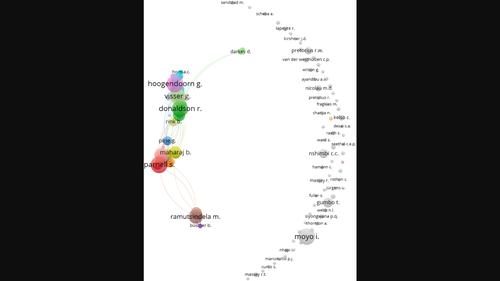‘Whispered in corridors’: Intra‐national politics and practices of knowledge production in South African Human Geography
IF 3.6
1区 社会学
Q1 GEOGRAPHY
引用次数: 0
Abstract
Abstract Reflections on the state of Geography around the globe have noted multiple challenges and opportunities—including a call for the reconfiguring of the discipline as a critical space of care and praxis (Daya, Transactions of the Institute of British Geographers, 47, 9, 2022). Such a call is indelibly connected to broader conversations on the politics of knowledge production and critical engagements with cultures of knowledge production. In order to realise the reconfiguring of the discipline, it is imperative to engage with the multi‐scalar politics and practices of knowledge production, to look beyond global inequalities and critically examine the intra‐national inequities and structural biases of knowledge production. Through a focus on South African Human Geography and detailed analysis of publication data and interviews with staff at universities across the country, we critically examine how the ‘haunting’ of apartheid legacies contributes to a double‐peripheralisation of staff at historically disadvantaged institutions while critical conversations remain ‘whispered in corridors’. This more granular engagement with the politics and practices of knowledge production highlights the entwining of intra‐ and inter‐national privilege which produces a mosaic of ‘cores’ and ‘peripheries’ in the uneven landscape of knowledge production that requires critical scholars to engage with on multiple scales in order to realise a more just and equitable knowledge economy.

“走廊里的耳语”:南非人文地理学的国家内部政治和知识生产实践
对全球地理现状的反思已经注意到多重挑战和机遇——包括呼吁将该学科重新配置为一个关注和实践的关键空间(Daya,英国地理学家学会学报,47,9,2022)。这样的呼吁不可避免地与更广泛的关于知识生产政治的对话以及与知识生产文化的批判性接触联系在一起。为了实现学科的重新配置,必须参与知识生产的多尺度政治和实践,超越全球不平等,批判性地审视国家内部的不平等和知识生产的结构性偏见。通过对南非人文地理的关注,对出版数据的详细分析以及对全国大学工作人员的采访,我们批判性地研究了种族隔离遗产的“萦绕”如何导致历史上处于不利地位的机构的工作人员的双重边缘化,而关键的对话仍然“在走廊里低语”。这种对知识生产的政治和实践的更细致的参与强调了国内和国际特权的交织,这些特权在知识生产的不平衡景观中产生了“核心”和“边缘”的马赛克,这需要批判性的学者在多个尺度上参与,以实现更公正和公平的知识经济。
本文章由计算机程序翻译,如有差异,请以英文原文为准。
求助全文
约1分钟内获得全文
求助全文
来源期刊
CiteScore
7.00
自引率
9.10%
发文量
72
期刊介绍:
Transactions is one of the foremost international journals of geographical research. It publishes the very best scholarship from around the world and across the whole spectrum of research in the discipline. In particular, the distinctive role of the journal is to: • Publish "landmark· articles that make a major theoretical, conceptual or empirical contribution to the advancement of geography as an academic discipline. • Stimulate and shape research agendas in human and physical geography. • Publish articles, "Boundary crossing" essays and commentaries that are international and interdisciplinary in their scope and content.

 求助内容:
求助内容: 应助结果提醒方式:
应助结果提醒方式:


